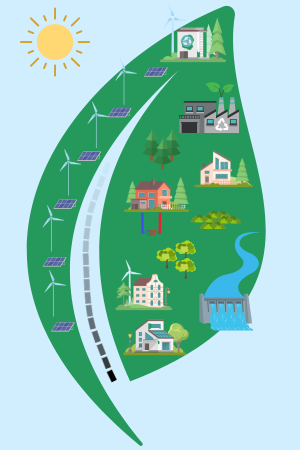
BIOMASS BOILERS
When the chips are down
Cutting energy
With the urgent need for sustainable energy solutions and the rising costs of conventional energy sources, biomass systems have emerged as an efficient, eco-friendly option for residential heating.
Biomass energy uses organic materials, such as wood pellets, chips, or logs, to produce heat and, in some cases, electricity.
It provides homeowners with an alternative energy source that is both renewable and potentially cost-effective.
Wood fueled power
At the heart of a residential biomass system is a biomass boiler or stove. These appliances burn biomass fuels to heat water, which can then be used for heating and hot water throughout the home, or in some systems, to generate electricity.
Biomass fuels are typically derived from waste materials, such as forestry residues or agricultural by-products, making them a renewable energy source.
Biomass heating systems offer several compelling benefits.
One of the most immediate is the potential cost savings. While biomass fuels can be more expensive than natural gas, they are often cheaper than heating oil, LPG, or electricity. This makes biomass an attractive option for homeowners currently relying on these more costly energy sources.
From an environmental perspective, biomass systems contribute to a reduction in greenhouse gas emissions. Biomass fuels are considered carbon neutral as the CO2 released during burning is offset by the CO2 absorbed during the plants' growth. This cycle ensures that no additional CO2 is added to the atmosphere, unlike fossil fuels.
Furthermore, biomass systems can contribute to local economies. Since biomass fuels can often be sourced locally, they help support local industries and reduce the need for imported energy.
However, while biomass systems offer numerous benefits, there are considerations to be aware of. The initial investment in a biomass boiler can be high, and the system requires space for the boiler and fuel storage. These factors can make it a less practical option for smaller properties.
In terms of efficiency, while modern biomass boilers are highly efficient, they may not match the efficiency levels of some conventional gas boilers. Furthermore, biomass boilers do require regular maintenance to ensure they operate efficiently and safely.
Lastly, while biomass fuels are renewable, sourcing them sustainably is crucial. Unsustainable biomass production can lead to deforestation and a negative impact on local ecosystems.
Despite these considerations, the potential advantages of biomass systems for home heating are substantial. As technology advances, and with proper regulation of fuel sources, the environmental and economic benefits of biomass systems are likely to increase, making them a more attractive and accessible option for homeowners.
In conclusion, biomass systems represent a significant step towards sustainable, renewable home heating. They offer the potential for cost savings, a reduced carbon footprint, and energy independence. With careful planning and consideration, adopting a biomass system can be a valuable part of a sustainable lifestyle and a greener future.
Assessment
We professional assess your property to determine the feasibility of installing a biomass boiler system, considering space for the boiler and fuel storage.
Depending on your location, there may be environmental regulations that affect the type of biomass system you can install, particularly concerning emissions.
Check with your local building authority about any regulations or restrictions on biomass boiler installations.
Installation
Depending on your heating needs, space, and the availability of different types of biomass fuel, we will help you select the appropriate boiler system.
Your installer will prepare the installation site, ensuring there's adequate space for the boiler, fuel storage, and, if necessary, an expansion tank.
The installation includes setting up the boiler, connecting it to your home's heating distribution and power systems, and setting up the exhaust flue for emissions.
Inspection
After installation, the system must be inspected for safety and compliance with local regulations.
Our installer will test all components of the system under various conditions to ensure it functions correctly and efficiently.
We ensure you receive proper training on operating the boiler, including refueling, setting controls, and understanding any warning signs of malfunction.
Plan for regular professional maintenance to keep the system running efficiently and safely. This can include cleaning the boiler, checking for leaks, and emptying ash pans.

